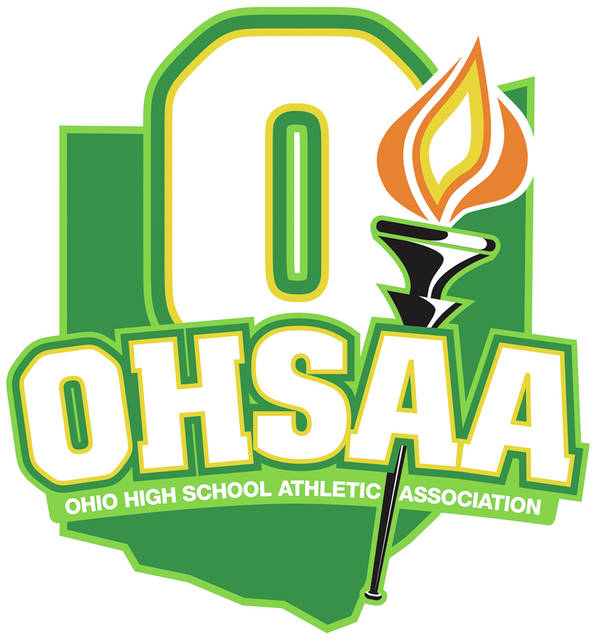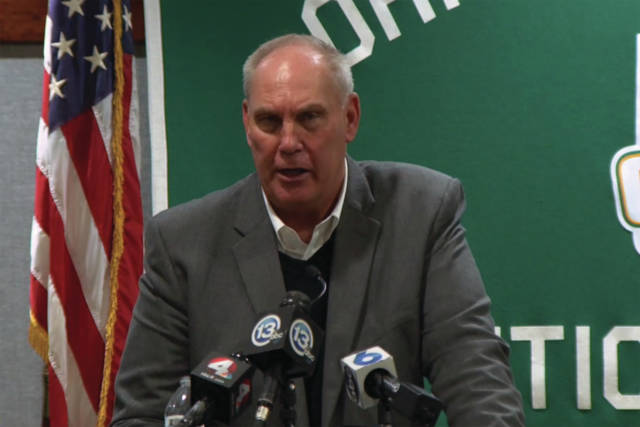

COLUMBUS — The Ohio High School Athletic Association left open the possibility of resuming the postponed winter sports tournaments, as well as maintaining its amended schedule for the delayed upcoming spring sports season — though those windows are closing fast.
OHSAA Executive Director Jerry Snodgrass made those announcements during a press conference Thursday afternoon, live-streaming it online in an effort to answer many of the organization’s member schools’ questions in the wake of the global pandemic caused by the coronavirus, COVID-19. And though the situation changes by the hour — the conference was held two hours before Governor Mike DeWine’s daily address — Snodgrass said he expects a decision to be made on the winter sports tournaments soon.
Last week, the OHSAA postponed the state wrestling, girls basketball and ice hockey tournaments and the regional and state boys basketball tournaments indefinitely. DeWine then announced that all schools would remain closed for three weeks, tentatively resuming on April 6, and the OHSAA said that spring sports practices could begin on April 6, with the regular season beginning on April 11 and the spring sports tournaments holding to their original schedule — and all of that remains in place. But as cancellations pile up country-wide and the likelihood of an extension to the school closure increases, plans could change at a moment’s notice.
“While the window of opportunity for our winter tournaments is closing rapidly, we still remain that they are on an indefinite postponement. But cancelling is on the table,” Snodgrass said. “Right now, the governor has closed schools for three weeks, with a return date temporarily set at April 6. We put a plan in place for a tentative schedule for our spring sports. However, what will change that overnight will be any decision by the governor to extend the closure of schools. And again, it doesn’t mean at this point with spring sports that we are cancelling. But is cancelling on the table? It absolutely has to be.”
And when asked why they weren’t cancelling the winter tournaments yet, Snodgrass said they wanted to exhaust every possibility to give the kids the chance to compete — but he did give a time frame.
“I challenge our staff every single day to look at every possible opportunity,” he said. “I often talk about throwing ideas up against the wall. Some of them are almost laughable — but maybe something sticks. And that’s what I’m holding onto. If it is inevitable, is there something creative we can do?
“I anticipate making that decision for winter sports probably (soon). We have to. I think it’s imperative that we don’t procrastinate. I don’t want to lead people on, that’s the No. 1 thing I do not want to do, and give them false hope.”
In his opening remarks, Snodgrass pointed out just how uncharted the territory is that the pandemic has put the state and the country in.
“Certainly, as everyone knows by now, the situation surrounding the virus and its affect on everyone’s daily lives is something that most in our generation have never dealt with before,” Snodgrass said. “One thing that this crisis has brought out is how important schools and school activities are in the lives of students, communities, parents and fans. That’s something that does not go unnoticed. And I think that one of the most important things to understand for everyone is, though we are in the athletic business … it’s more important to understand, now more than ever, that we are in the education business. That we in school-based sports are an extension of the classroom.
“The decision by Governor DeWine last week — just a week ago — to close down classrooms to help increase social distancing was certainly not made lightly. Our decision, my decision, to postpone tournaments at that time was certainly not made lightly, either.”
And even though those decisions were made only one week ago, events have continued to move at a rapid pace.
“However, the governor stated in his address yesterday that it is here, referring to the COVID-19 virus. It is here, and we must be at war with it,” Snodgrass said. “And we have a duty and a responsibility to help with that war to fight it, and we are going to do that.”
And while some have criticized the measures and postponements as an overreaction and accused the OHSAA of taking away opportunities from its student-athletes, Snodgrass maintained that he knows just how important athletics are in those students’ lives — but those lives themselves, as well as the lives of those that may come into contact with the athletes and fans — must still be protected from the dangerous disease.
“Over the past 10 days, I’ve heard from so many students who have talked about how important a softball game, how important a track meet, how important competing for that state title in hockey, that wrestler who worked so hard to get to the state tournament, how important that is in their lives,” he said. “None of us, our staff or myself, will never, ever underestimate that. I’m a parent, I was a teacher, I was a coach, I was an administrator. I think I understand that as well as anyone. So all decisions are not going to be made on emotions. We have to make the best judgments we can make based on fighting that war as the governor indicated.”
And when it comes to whether or not the winter tournaments could still happen, there were just too many moving pieces to allow a decision to be made by Thursday.
“There are so many factors that people don’t realize: site availability; coaches’ availability; keeping in mind that our officials, there are people that are in the risk category that we cannot and will not subject to being faced with being infected with this virus,” Snodgrass said. “Much of this hinges on future decisions by the governor, on whether we close schools for a longer period of time.
“Extending our tournaments into the summer months, extending them even into May, is very problematic on a lot of different fronts. Everything is on the table.”
Snodgrass also said that giving the affected high school student-athletes an extra year of eligibility, as some college leagues have done, was not something that was being considered. He also discussed the no-contact policy between athletes and coaches as a way of encouraging social distancing but said that coaches and athletes could communicate through electronic means, and that athletes should be continuing their workouts at home.
He also discouraged student-athletes from participating in non-school organized sports, such as AAU basketball or travel or club teams — and other less legitimate things popping up to capitalize on the virus’ effects.
“We can regulate our school events. We cannot regulate the non-school activities. We have no authority over that,” Snodgrass said. “The second we made the decision to implement the no-contact period, instantly people were developing all these club travel programs so kids could gravitate to it right away. We even had one site, the very next day, called ‘corona baseball.’ And it was developing a league for all these high school kids to get together and play — which totally contradicts the CDC’s recommendations. It even used our logo. Very problematic.
“It’s not about denying kids the opportunities. It’s about attacking this virus the way we need to do it.”
And in the end, it’s a fight that Snodgrass said would be won.
“We will come back. Athletics will come back,” he said. “School athletics will come back. And now more than ever, we need to be unified, from our schools and our coaches, to get to that. It will emphasize the good things in high school sports, and I think that’s something that will rise out of this.”



